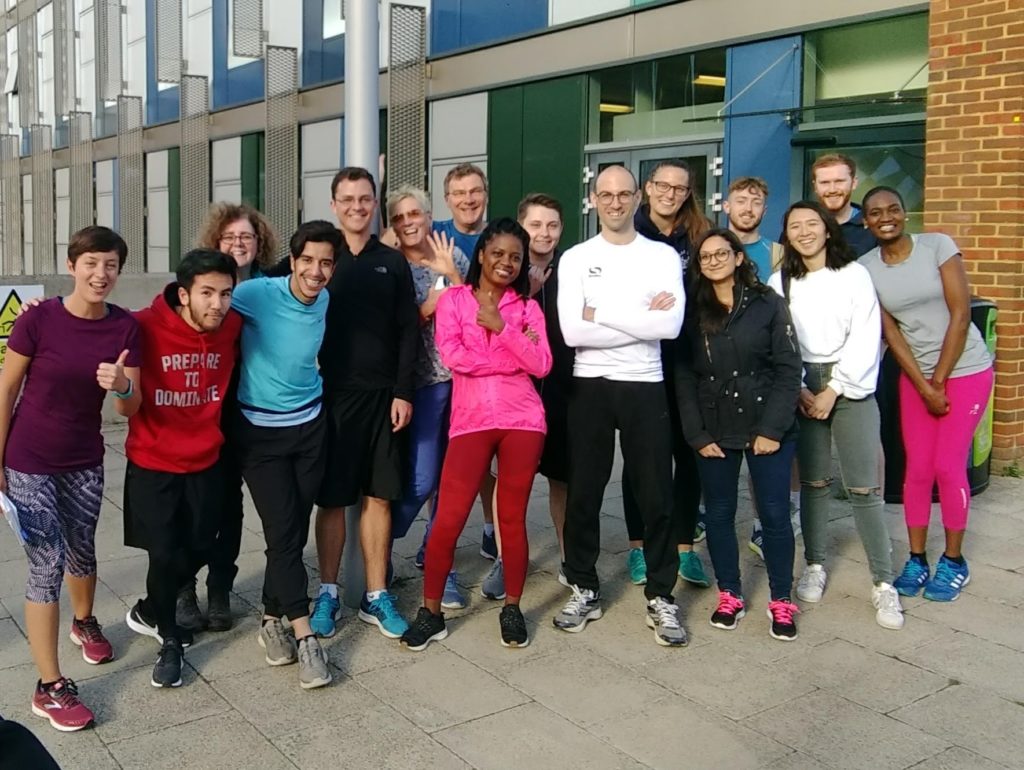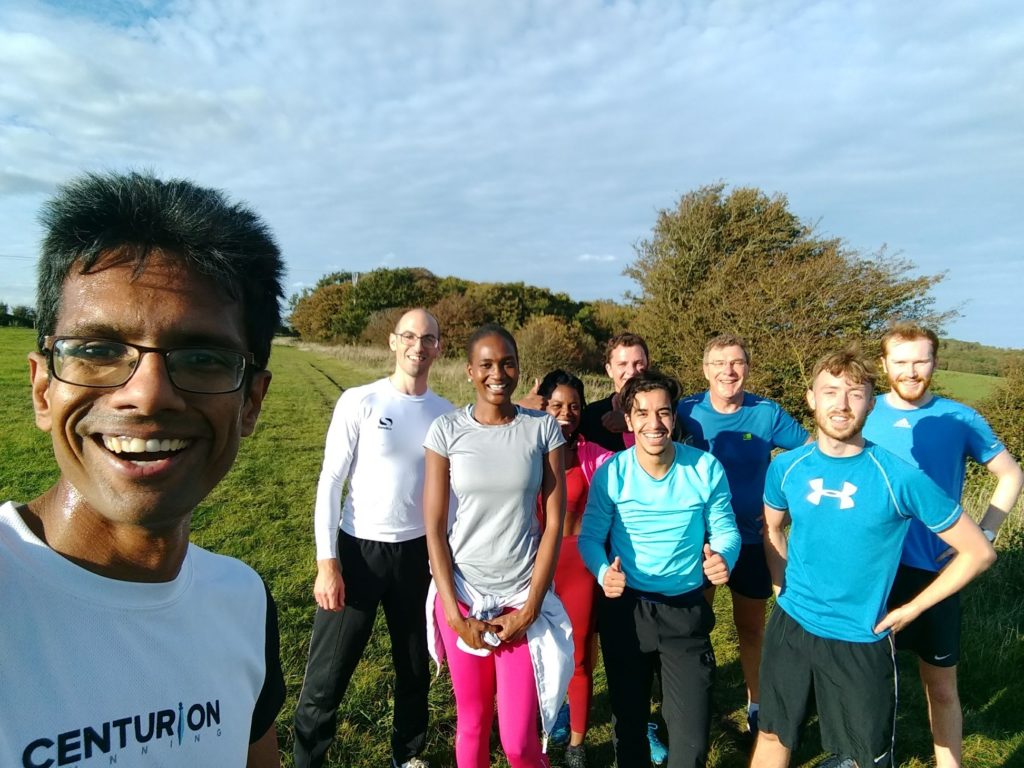
By Dr. C. Rashaad Shabab
Senior Teaching Fellow in Economics
For the last two academic years, members of the University of Sussex Business School have been meeting weekly during term-time behind the School’s academic building for a social run in the national park surrounding the campus. The objective of this initiative has been to support the mental health of our students and staff while enhancing the sense of community in the School.
However, the recent outbreak of the novel Coronavirus and the ensuing government recommendation in favour of social distancing has meant that for the first time in years, the weekly group meetings have had to be suspended. This suspension is especially unfortunate as it occurs at a time when students and staff are under acute stress due to the academic, personal, social and economic uncertainties created by the pandemic.
To continue to support mental health promoting behaviours among students during this time of heightened stress, the running group will host ‘virtual group runs’, where members post statistics and pictures from their solo runs to the group’s page. This is consistent with the government advice on social distancing that is necessary to maintain the community’s physical health, while also encouraging students to continue to engage in an activity that benefits their mental health.
Students are under heightened stress
The Covid-19 pandemic has placed on our students under tremendous strain. After weeks of uncertainty and unusually low attendance as the pandemic spread across the world, teaching has been suspended and the university has committed to moving all teaching online. Students have been informed that all assessments too will occur online. Both moves, while clearly necessary, are likely to induce further uncertainty thus anxiety. Finalists are worried whether new exam arrangements can be implemented in time, as delays may affect their ability to avail job offers or offers of admission to graduate programmes which are conditional on timely completion of their degrees.
These academic stressors aside, students are likely to be anxious about their own physical health and also about the physical health of their relatives and friends who may be elderly, pregnant or have pre-existing conditions. This anxiety may be heightened by social distancing as the usual coping mechanisms and channels of support that students rely on such as gathering with friends will be unavailable to them.

A large fraction of the student body at the University of Sussex is international and this pandemic has been especially difficult for these members of our community. China and Italy, the two countries that have so far witnessed the largest number of fatalities from the virus, are also countries from which the university draws a substantial pool of international students. These students are likely to have suffered from feelings of anxiety and helplessness at having to watch from afar as their home communities were ravaged by infection. In addition to the factors back home, here in the UK there has been a surge in anti-Asian racism that is likely to have affected our students. Furthermore, the practicalities of booking flights to leave the UK, the very real possibility of quarantine upon departure and the financial pressures that these factors may induce are also likely to increase the incidence of stress among international students.
There are students who for a variety of reasons, simply cannot return home. This may include students whose countries have sealed their borders, students for whom it is financially infeasible to return home at the current time, and students who for whatever reason do not have a safe or welcoming place to return to. As teaching is moved online, there will inevitably be a wide-spread emptying of the campus. The sense of isolation and vulnerability that can accompany the feeling of being left behind by one’s peers is likely to affect these members of our student body, to whom we have a clear duty of care.
Last but by no means least, the short-term economic consequences of the outbreak may place immense financial pressures on students, many of whom depend on employment on precarious, zero-hours contracts to cover their living expenses. Students are often employed in the hospitality and related services industry where firms face heightened risk of closure in the current economic climate.
Social distancing can exacerbate stress
National[1] and international[2] public health organizations have been unanimous in recommending what has come to be known as “social distancing,” the practice of avoiding interpersonal contact wherever possible, as a tool to reduce the rate of contagion. Indeed, at the time of writing the latest advice from the UK government is to curtail all non-essential social interaction. However, there is considerable concern among the scientific community that while social distancing may slow the spread of the virus and thereby protect our physical health, it is likely to have adverse effects on our mental health, especially for those who are already under stress.

As Yale University social scientist Nicholas Christakis put it to Science[3], social distancing is “Calling on us to suppress our profoundly human and evolutionarily hard-wired impulses for connection: seeing our friends, getting together in groups, or touching each other.” In the same article, Greg Miller goes on to catalogue the known effects of reduced social interaction which include increased risk of heart disease, depression, dementia and even death. The article goes on to observe that the evidence suggests that people who are under existing stress are likely to be more vulnerable. Thus, the anxiety and stress induced by the Coronavirus on our student body is likely to be exacerbated by the social distancing measures that are necessary to slow down the spread of the virus.
Outdoor exercise maintains social distancing and supports mental health
Clearly, a running group – even one intentioned to support mentally healthful behaviour among students and staff – is non-essential. Thus, continuing to meet as the group had done under normal circumstances would be in contravention of government’s guidance on social distancing. This is also the view of England Athletics, the country’s apex governing body for the sport, who have advised that “All face-to-face activity such as club training sessions, […] running groups and social events should be suspended until at least the end of April” [4].
In contrast to the advice on group exercise, official government advice recommends individual outdoor exercise so long as people maintain two meters distance from others1. Running, especially in the national parkland surrounding the university campus, is wholly consistent with the current advice (this of course will cease to be true if the advice changes and the region enters a stricter lock-down as has been initiated in parts of China, Italy and now France). What is more, even solitary running is known to protect against and mitigate some of the mental health conditions which the current situation may place students at heightened risk of, including anxiety, depression, and sensitivity to stress[5],[6].
Taking community online
While many of the mental health benefits of group exercise can be reaped from solitary sessions in a time of social distancing, others may be missed. There are a range of important reasons that people exercise in groups to begin with. Groups serve as a commitment mechanism, whereby people are more likely to engage in exercise if they feel they are accountable to others for doing so. Groups can create a sense of shared camaraderie as individuals bear witness to and celebrate each other’s efforts. They can provide a platform to seek advice on running, but also on other sources of life stress during times of crisis. Each of these helpful aspects of group running can, albeit imperfectly, be replicated in an online community, when social distancing precludes in-person interactions.

The platform on which these interactions will be taken online is The Business School Running Group’s Facebook page,[7] which has over one hundred members. A message has been posted to this page explaining why the group can no longer meet in person and encouraging members to participate in ‘virtual group run’ experiments. In the virtual run, members are encouraged to all go for a run at the usual time that the group used to meet but starting and stopping at their respective locations of current residence. This circumvents the need to use public transport to get to a predetermined location and eliminates in-person interactions during the run. To facilitate virtual social interactions members have been asked to subsequently upload the data from their respective runs to the group page so others can view, comment on, and encourage their efforts.
Concluding remarks
It remains to be seen if the sense of community and mutual support that the Business School Running Group has been able to create in the physical space centred around our academic building can be replicated in an online platform. It is an open question as to whether such a move will foster continued student engagement, helping students feel less isolated and more connected to our campus and our community as we transition to online teaching in the wake of the ongoing pandemic. At the very least, however, one hopes that this initiative sends students a credible signal that the University of Sussex is committed to supporting their wellbeing in innovative ways, even under difficult and unprecedented circumstances.
[1] Public Health England. 2020. Guidance on social distancing for everyone in the UK and protecting older people and vulnerable adults. Available: https://www.gov.uk/government/publications/covid-19-guidance-on-social-distancing-and-for-vulnerable-people/guidance-on-social-distancing-for-everyone-in-the-uk-and-protecting-older-people-and-vulnerable-adults
[2] World Health Organisation. 2020. Coronavirus disease (COVID-19) advice for the public. Available at: https://www.who.int/emergencies/diseases/novel-coronavirus-2019/advice-for-public
[3] Miller, G. 2020. “Social distancing prevents infections but it can have unintended consequences”. Science. Available at: https://www.sciencemag.org/news/2020/03/we-are-social-species-how-will-social-distancing-affect-us
[4] England Athletics. 2020. Coronavirus Statement (Updated 17th March). Available at: https://www.englandathletics.org/athletics-and-running/news/coronavirus-statement/
[5] Salmon P. 2001. “Effects of Physical Exercise on Anxiety, Depression and Sensitivity to Stress – A Unifying Theory”. Clinical Psychology Review, Vol.21, 1, pp.33-61. ISSN: 0272-7358
[6] Kvam S, Catrine Lykkedrang Kleppe, Inger Hilde Nordhus, Anders Hovland. 2016. “Exercise as a treatment for depression: A meta-analysis”. Journal of Affective Disorders, Volume 202, Pages 67-86.
[7] Available here: https://www.facebook.com/groups/695862687186790/


Leave a Reply